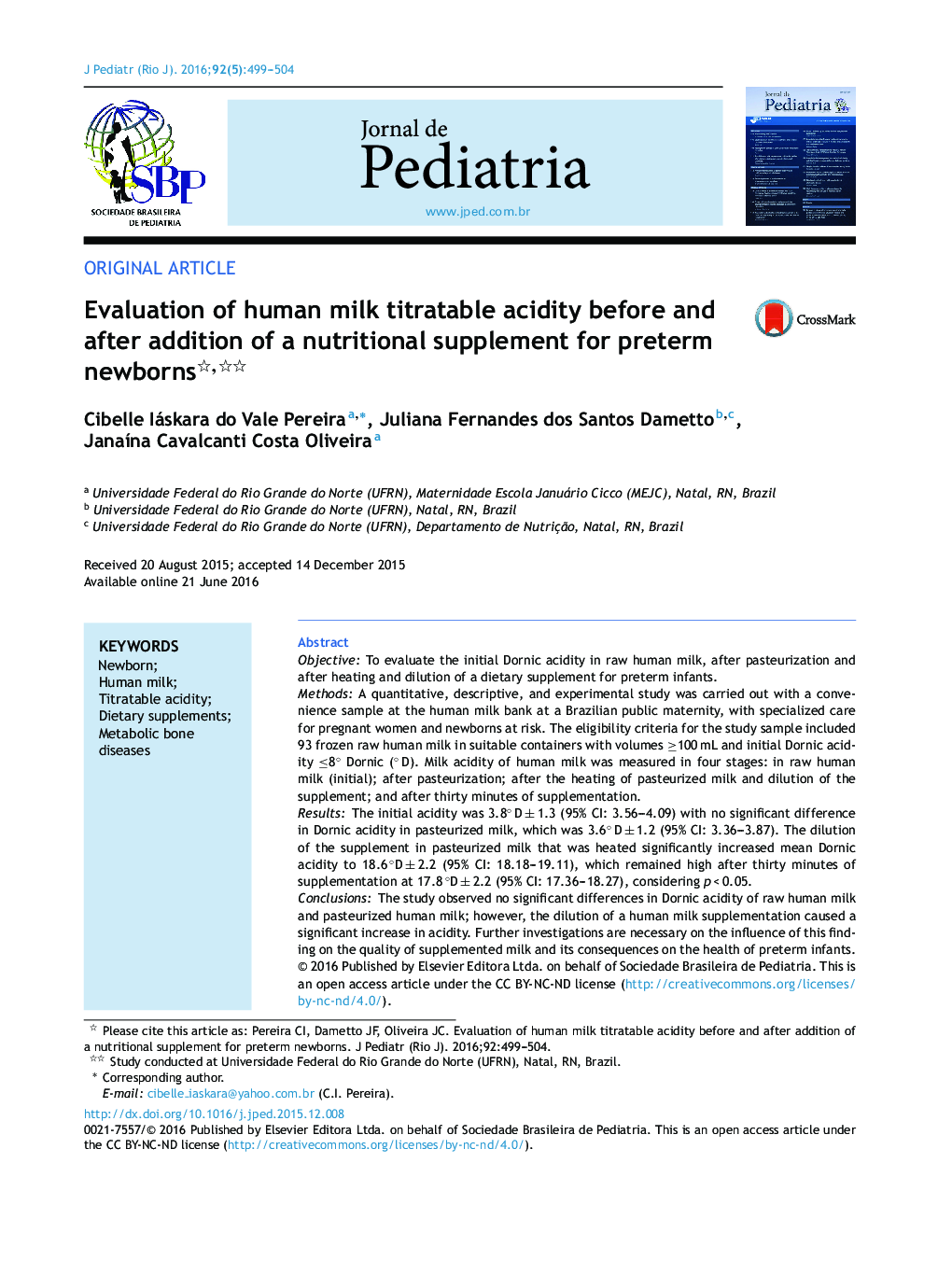| کد مقاله | کد نشریه | سال انتشار | مقاله انگلیسی | نسخه تمام متن |
|---|---|---|---|---|
| 4153756 | 1607064 | 2016 | 6 صفحه PDF | دانلود رایگان |
ObjectiveTo evaluate the initial Dornic acidity in raw human milk, after pasteurization and after heating and dilution of a dietary supplement for preterm infants.MethodsA quantitative, descriptive, and experimental study was carried out with a convenience sample at the human milk bank at a Brazilian public maternity, with specialized care for pregnant women and newborns at risk. The eligibility criteria for the study sample included 93 frozen raw human milk in suitable containers with volumes ≥100 mL and initial Dornic acidity ≤8° Dornic (° D). Milk acidity of human milk was measured in four stages: in raw human milk (initial); after pasteurization; after the heating of pasteurized milk and dilution of the supplement; and after thirty minutes of supplementation.ResultsThe initial acidity was 3.8° D ± 1.3 (95% CI: 3.56–4.09) with no significant difference in Dornic acidity in pasteurized milk, which was 3.6° D ± 1.2 (95% CI: 3.36–3.87). The dilution of the supplement in pasteurized milk that was heated significantly increased mean Dornic acidity to 18.6 °D ± 2.2 (95% CI: 18.18–19.11), which remained high after thirty minutes of supplementation at 17.8 °D ± 2.2 (95% CI: 17.36–18.27), considering p < 0.05.ConclusionsThe study observed no significant differences in Dornic acidity of raw human milk and pasteurized human milk; however, the dilution of a human milk supplementation caused a significant increase in acidity. Further investigations are necessary on the influence of this finding on the quality of supplemented milk and its consequences on the health of preterm infants.
ResumoObjetivoAvaliar a acidez Dornic inicial no leite humano cru, após pasteurização e após aquecimento e diluição de um suplemento nutricional para recém-nascidos prematuros.MétodosEstudo quantitativo, descritivo, experimental com amostragem por conveniência, realizado no Banco de Leite Humano de uma maternidade pública brasileira, com assistência especializada às gestantes e recém-nascidos de risco. Os critérios de elegibilidade das 93 amostras do estudo incluíram leites humanos crus congelados em embalagens apropriadas, com volumes ≥ 100 mL e acidez Dornic inicial ≤ 8°Dornic (°D). A acidez Dornic dos leites humanos foi mensurada em quatro momentos: no leite humano cru (inicial); após pasteurização; após aquecimento do leite pasteurizado e diluição do suplemento; e após transcorridos trinta minutos de suplementação.ResultadosA acidez inicial foi de 3,8°D ± 1,3 (IC 3,56–4,09) não apresentando diferença significativa em relação à acidez Dornic no leite pasteurizado, que foi 3,6°D ± 1,2 (IC 3,36–3,87). A diluição do suplemento no leite pasteurizado e aquecido aumentou significativamente a média da acidez Dornic a 18,6°D ± 2,2 (IC 18,18–19,11), a qual se manteve elevada em 17,8°D ± 2,2 (IC 17,36–18,27) após 30 minutos da diluição, considerando p < 0,05.ConclusõesO estudo demonstrou que a acidez Dornic do leite humano cru e do leite humano pasteurizado não apresentaram diferenças significativas entre si, porém, a diluição do suplemento de leite humano promoveu elevação significativa da acidez. Maiores investigações da influência desse achado sobre a qualidade do leite suplementado e suas consequências na saúde de prematuros são necessárias.
Journal: Jornal de Pediatria - Volume 92, Issue 5, September–October 2016, Pages 499–504
